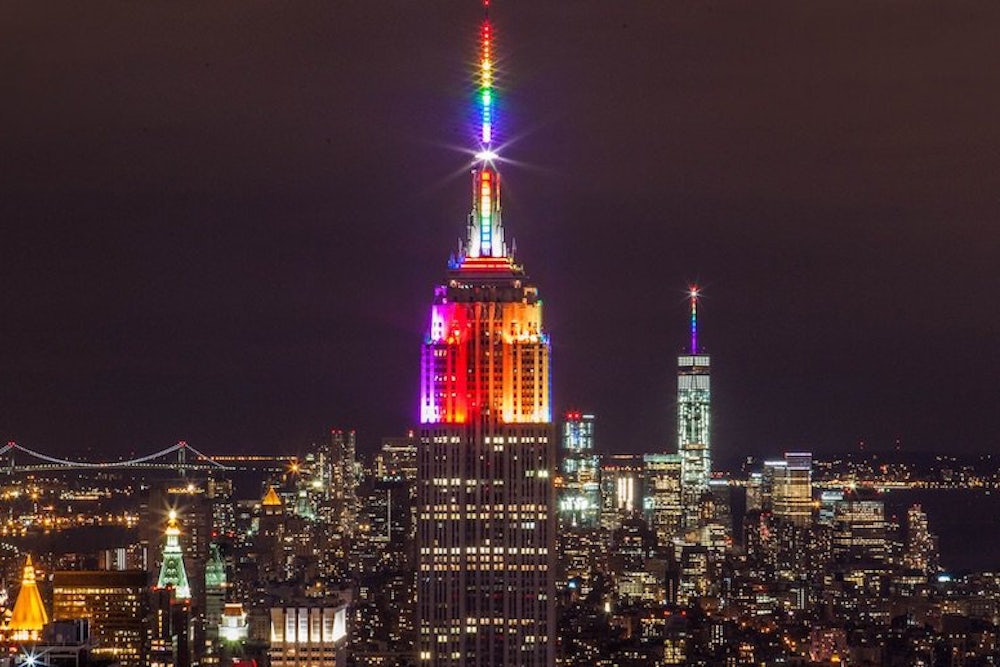It's tempting to see the Supreme Court's decisions last week to uphold Obamacare and legalize gay marriage as wildly divergent from its decision on Monday to strike down EPA regulations regarding coal-fired power plants. But there is a unifying theme: All three decisions fall in line with the Roberts Court’s warm embrace of causes backed by big business.
From its very inception, Obamacare was designed to appeal to the country’s biggest insurers, hospitals, and other major business interests, as the law’s coverage expansion promises them millions of new customers. More specifically, one of the key parts of the law is a massive expansion of the private marketplace for individual insurance, which was propped up by government subsidies but not government-run insurance plans—much to the chagrin of progressives who were clamoring for a public option or Medicare for All.
Had the plaintiffs prevailed in King v. Burwell, health insurers would have immediately lost $25 billion in subsidies, as well as millions of paying customers who would not have been able to keep their coverage without the financial support. To be sure, Chief Justice John Roberts didn't rule in favor of Obamacare simply to boost business' profits. But his acknowlement that Congress intended "to improve health insurance markets, not to destroy them" comes with a good deal of upside for the health insurance industry as well. That’s why America’s biggest insurance lobby hoped the court would side with the government—and why health care stocks spiked after the ruling.
The support of corporations and business leaders has also been critical to the success of the marriage equality movement and the broader effort to make the LGBT community a part of mainstream American culture. As support for gay rights has grown, LGBT allyship has become a major marketing opportunity for many of the country’s biggest corporations. Bud Light, McDonald's, Virgin Airlines, and the Bank of America were among the corporate sponsors of San Francisco pride parade this Sunday. Major retailers likey J.C. Penney and Tiffany & Co. are also beginning to incorporate gay couples and families in broader advertising campaigns.
Business leaders have also helped lead the charge against anti-LGBT discrimination, which they’ve increasingly come to see as bad for business. In March, Walmart said an Arkansas law allowing businesses to turn away LGBT customers on the basis of religious freedom “threatens to undermine the spirit of inclusion present throughout the state of Arkansas and does not reflect the values we proudly uphold.” The tech sector has also been at the forefront: “Apple, Google, and Facebook not only enacted internal employee non-discrimination policies, they often publicly campaigned for gay rights. Apple, for its part, sanctioned gay employee groups as early as 1986,” gay rights advocate and attorney Richard Socarides points out. One of the movement’s most influential donors and activists, Tim Gill, is a tech multimillionaire who's bankrolled successful fights for LGBT rights on the state level and has encouraged other business leaders to support the cause as well.
The gay rights movement’s success in developing corporate allies has helped turned marriage equality into the new normal. More than 370 major businesses signed an amicus brief to support marriage equality, arguing that the failure to legalize gay marriage would hurt employee morale, recruitment, and workforce administration. Justice Anthony Kennedy referenced that changing climate in his opinion: “They see governments and businesses modifying policies and practices with respect to same-sex couples, and participating actively in the civic discourse.” Business now wants to make the most of that allyship, and many rushed to show their support for gay rights following the Supreme Court's ruling.
Businesses, of course, weren’t ultimately the biggest winners in last week’s rulings: Those were the millions of Americans who’ve gotten more affordable health coverage and whose marriages have been legalized across the country. But as with Monday’s EPA decision, both rulings reflect the underlying modus operandi of the Roberts Court: If it’s welcoming to business interests, it’s far more likely to prevail.
Correction: An earlier version of this story stated that $25 million in Obamacare subsidies were at stake in King v. Burwell. The figure is $25 billion.
